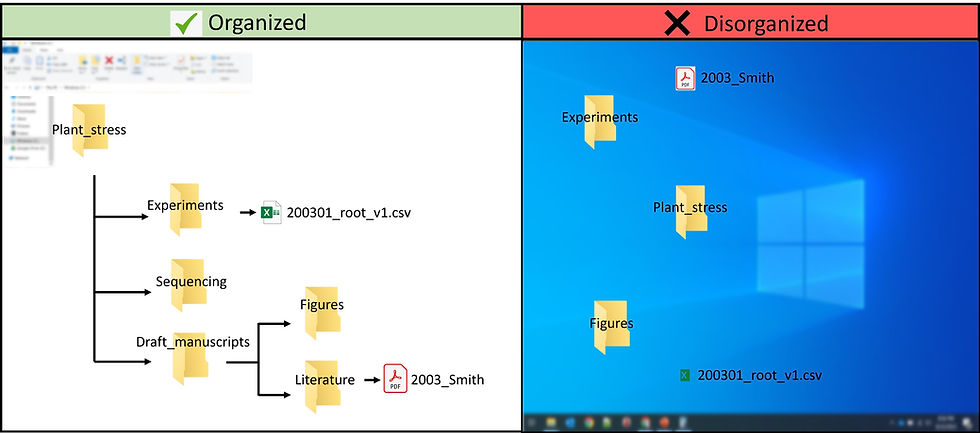Tips to succeed as a scientist in academia
- Cristina Howard-Varona
- Nov 1, 2023
- 4 min read
These tips can help you throughout your career as an academic scientist, some of them may be especially useful during the early years of your PhD journey.
Most important rules: 1) Learn how to say "no". 2) Make a daily list of the 3 most important tasks you want to accomplish, and get them done. 3) No phone or social media during work hours (9 am to 5 pm). Emergencies are exceptions. 4) Sleep a full night, every night (7-9 h is recommended). 5) Excercise 30 min a day at least every other day.
Do 'quick' tasks now: If something is going to take 5 minutes or less to complete, do it now; don’t put it off for later.
Have balance: find a hobby, join a church group, start a sport, etc. It will help with efficiency and giving you a break.
Know the literature: Read every paper in your topic, even those from decades ago. The goal is to become an expert in your field, and it starts with knowing what your predecessors discovered before you.
Spend time thinking: It's tempting to keep busy doing experiments in the lab, or producing analyses and graphs in front of your computer. However, that's "aimless" research. The most productive, efficient use of your time is to come up with your own hypothesis and set of questions to answer, and ensure that every experiment or analysis you do is aimed towards answering those questions. It also helps to think about what you would like the publication to read, what kind of story you want to tell, and work towards that vision.
Mentor-up: work with a senior person with more expertise or different expertise to help you grow in your training and in getting more publications.
Keep a record of your results in a running document: Create a power point presentation or a word document and store results chronologically. Use this document as a diary in the sense that every time you have a result, add it to the document with the figure and its capture. What's the figure for that result and what does this result mean? This helps create a roadmap of your work, where you can see where you've been and where you're going. Putting all your results down somewhere like this also helps you think about your work. A collaborative platform like Google or Microsoft makes it easy to share this document with others. Finally, a running document keeps everything organized in one place, so that you can easily find everything in the future when you no longer remember what experiments or analyses you have already done.
Present your research to an audience as frequently as possible: Your lab will likely have a lab meeting where you can present your research. This is a good place to get feedback on your work from an audience that knows the field. But if presenting at lab meeting is not an option, gather some friends and ask them to listen to an update of your research. Presenting your research to an audience forces you to make a power point presentation with the results of your work. This also forces you to stop analyses, think about what the analyses that you have so far mean, make figures of your results, write take home messages, and start the process of creating a story with your research data. Here are tips on creating presentations.
Be collaborative: Work with others who have the expertise you don't; it will help get your name on publications.
Be a mentor: once you have a handle on your own research, once you’re an expert and can teach others, mentor an undergraduate student or a younger grad student. Tips on mentoring others.
Build your network: Create a LinkedIn account, a Researchgate account, a Twitter account. Post your research projects and papers in these sites. But keep it professional and science-focused, and don't check these accounts every day, as social media is a big time-suck that takes away from productivity. A good rule of thumb is to only get on social media to post grant awards, to advertise your newest publication, or job updates.
Build your CV: Every time you achieve something (like a publication, a grant, a conference) put it on your CV immediately so you don’t forget it happened or when it happened. It takes much less time to do it immediately than to wait until someone asks you to submit an updated CV and you have to dig through past records to update your CV.
Save your work: If you store data anlyses, documents, presentations, figures, etc, in your computer, make sure it's all backed up at least once a week. If you don't have enough storage space in your local machine, you can use an external harddrive or ask the university if there is a 'cloud' where you can save your work at. They may even have a 'cloud' space where you can work directly, meaning it's a shared folder in your cloud account with the university where you can generate and save all your work.




These are superb tips. 🎯
I particularly like the suggestion to keep a running file or results - I have my team members do this and it is SO helpful. Beware bifurcation into multiple files, as it's harder to find things later.
The only tip I might suggest refinement of is "Read every paper in your topic"; some topics are diverse and have a very large amount of literature. And, reading deeply is slow, at least for some of us (I am SUCH a slow reader!). So, perhaps something like "Keep up with the literature in your topic, and regularly seek earlier related papers - even from decades ago - to supplement your reading. Ensure you read all the k…